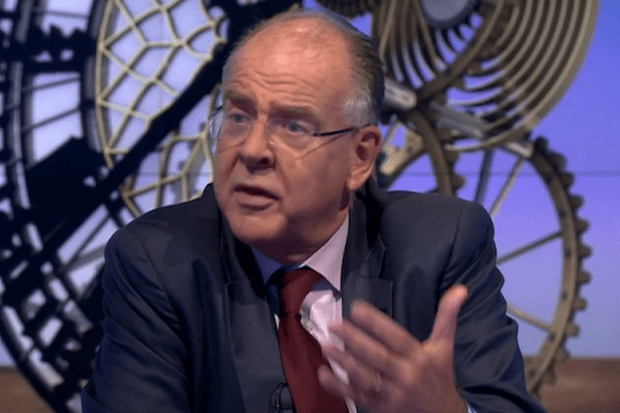Charlie Falconer is one of the few figures closely associated with Blairism serving in Jeremy Corbyn’s shadow cabinet, which isn’t surprising given the new leader’s mandate. In an extraordinary interview on the Sunday Politics, the shadow justice secretary said he was serving under Corbyn because ‘I want to make the opposition as effective as possible in holding the government to account’ — while outlining a long list of policy areas he is at odds with the leadership on. As well as saying he would quit if Labour campaigns for a Brexit, Falconer has revealed no fewer than twelve other areas where he differs with Corbyn and John McDonnell.
1. Leaving Nato
Corbyn has previously said that Britain should consider leaving Nato (he has since backtracked). Falconer disagrees:
‘He said during the course of the leadership election for example, we might think about withdrawing from Nato – that would obviously be a position I couldn’t agree with.’
2. Trident
The Labour leader has advocated scrapping Britain’s Trident nuclear weapons, something else he has recently softened his views on. Falconer also disagrees:
‘I am in favour of renewing the Trident nuclear deterrent and a continuous at-sea nuclear option.’
3. Bank of England independence
The new shadow chancellor John McDonnell has said interest rates should be set by the government and the Bank of England’s independence is illusory. Again, Falconer has a different view:
‘I am in favour of the Bank of England remaining independent. I think the importance of the Bank of England remaining independent is that it gives economic confidence — it was a very important thing in making sure that inflation is kept under control. So I’m in favour of keeping the Bank of England independent.’
4. Academies
Corbyn has argued Labour needs to ‘rethink’ the role of academies and has promised to limit their freedoms. Falconer said the programme should continue:
‘I think the academy programme is a very worthwhile programme. I think you need local education authorities to be able to provide proper strategic control in these areas. How you match the two needs to be discussed but I would not want to see the academy programme abandoned.’
5. Welfare cap
Corbyn said during his speech at the TUC conference that the welfare cap should be scrapped. Falconer said it should remain in place — for now:
‘As far as the individual welfare benefit cap is concerned, you need to have measures to ensure that there is proper control of individual entitlements to welfare. Whether that is the best method I’m not sure but for the moment it is the method that Labour supported in the last election…my own view is that it is a quite sensible measure but only on the basis it doesn’t, for example, prevent money being available for housing associations to make sure they can do house building.’
6. Nationalising the National Grid
Falconer and Corbyn disagree on nationalising the National Grid:
‘I’m not in favour of that – that would be going too far. I think that would be a vast expenditure when there are so many other things we should be spending money on. That would not be the right thing to do.’
7. Nationalising the banks
John McDonnell has advocated nationalising the banks. Falconer naturally disagrees:
‘I’m not in favour of nationalising the banks, though it is true to say that two of our major banks were for a considerable period of time, from 2007 or 8 to 2015, in government hands but I’m not in favour of that.’
8. Arresting Tony Blair
The shadow chancellor has said Tony Blair should be arrested, something the shadow justice secretary disagrees with:
‘I’d say that’s complete non sense. Tony Blair is not a war criminal, that’s just off the page.’
9. Apologising for Iraq war
Corbyn has said he will apologise for the Iraq war on behalf of the Labour party. Falconer said he doesn’t think it’s a good idea, noting ‘it wasn’t an illegal war’:
‘I don’t think we should should apologise but that’s a matter for Mr Corbyn to decide whether he’s going to apologise.’
10. McDonnell’s involvement in IRA process
The shadow chancellor apologised this week for any offence caused by his 2003 remarks regarding the IRA, suggesting he was only trying to help the peace process, suggesting as he did that his work was integral to the process. But Falconer, who was a member of the cabinet at the time, said he ‘wasn’t personally aware’ McDonnell had anything to do with it.
11. Bombing Syria
Corbyn has said he is against bombing Syria. Like many other Labour MPs, Falconer has a different view:
‘My view in relation to the attacks on Syria is that if there is a military and legal basis for doing it, then we should do it.’
12. Whether Corbyn will be Prime Minister
Does the new Labour leader want to be Prime Minister? ‘Of course’, he said during the leadership election. Falconer wasn’t particularly ebullient about whether he will be:
‘I have no idea – what we’re go to do is try and make Labour an effective opposition and we need try and make Labour a party that the public think can govern.’
The question following this interview is: why is Falconer serving? Most Labour modernisers have decided to sulk and plot on the back benchers and let the Corbyn leadership implode. But others, such as Falconer, are challenging the concept of collective responsibility and he appears to want to have his say on what’s going on in the party. Judging by his comments today, there are going to be some feisty debates in shadow cabinet meetings between Corbyn, McDonnell and Falconer. How long will he last?






Comments